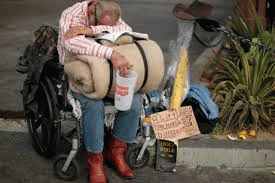(Article changed on January 16, 2014 at 13:30)
(Article changed on January 16, 2014 at 13:14)
Governor Jerry Brown and his staff are exchanging high-fives over balancing California's budget, but the people on whose backs it was balanced are not rejoicing. The state's high-wire act has been called "the ultimate in austerity budgets."
Welfare payments, health care for the poor, and benefits for the elderly and disabled have been slashed. State workers have been downsized. School districts in need of cash have been reduced to borrowing through "capital appreciation bonds" bearing 300% interest. In one notorious case, the Santa Ana school district actually borrowed at 1,000% interest. And the governor acknowledges that California still faces a "wall of debt" amounting to $28 billion. Some analysts put it much higher than that.
At the end of the 20th century, California was ranked the sixth largest economy in the world. By 2012, it had slipped to number twelve. It is coming back up, in part because European countries are falling further into recession; but California's poverty rate remains the highest in the country. More than eight million Californians struggle to meet their daily needs, and one in four children lives in poverty. Income inequality is higher in the nation's most populous state than in almost any other.
California cannot solve its budget problems by slashing services that have already been cut to the bone or raising sales taxes that hurt the poor far more than the rich. We are fighting over a pie that remains too small. The pie itself needs to be expanded -- and it can be.
How? By reclaiming that portion that is now siphoned off in interest and bank fees. When tallied up at every stage of production, interest has been calculated to claim one-third of everything we buy.
How can that money be recaptured? By owning the bank.
The approach was pioneered in North Dakota, the only state to escape the 2008 banking crisis. North Dakota has the lowest unemployment rate in the country, the lowest foreclosure rate, the lowest default rate on credit card debt, and no state debt at all. It is also the only state to own its own bank.
In the fall of 2011, a bill for a feasibility study for a state-owned bank passed both houses of the California legislature. The Public Banking Institute, which I founded and chair, was instrumental in helping to get the bill as far as it got. But it died when Jerry Brown vetoed it. His rationale was that we already have a banking committee, and that the matter could be explored in-house. Needless to say, however, we have heard no more about it since.
I am therefore running for California State Treasurer on a state bank platform, along with Laura Wells, who is running for Controller. We are throwing our bonnets in the ring for the opportunity to show the Governor or his successor that a state-owned bank can be our ticket to returning California to the abundance it once enjoyed.
I was a recipient of that abundance myself. I got my undergraduate degree at UC Berkeley in the 1960s, when tuition was free; and my law degree at UCLA Law School in the 1970s, when tuition was $700 a year. Today it is $13,000 and $45,000 annually, respectively, for in-state students. In the 1960s, the governor of California was Jerry Brown's father Pat Brown, a New Deal visionary who believed that investment in education, infrastructure and local business was an investment in the future. Our goal is to revive that optimistic vision in 2014.
We are running on the endorsement of the Green Party -- along with Luis Rodriguez for governor and David Curtis for secretary of state -- because Green Party candidates take no corporate money. Candidates who take corporate money -- and that means nearly all conventional candidates -- are beholden to large corporate interests and cannot properly represent the interests of the disenfranchised 99%.
The North Dakota Model:
Banking that Supports Rather Than Exploits the Local Economy
(Note: You can view every article as one long page if you sign up as an Advocate Member, or higher).






